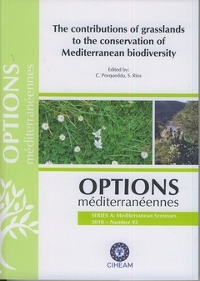| Article précédent | p. 265-269 | Article suivant |
Variability in natural populations of Sinorhizobium meliloti in Morocco
In Morocco, alfalfa (Medicago sativa L.) is being grown in harsh environments (such as mountains and oasis) and is frequently subjected to abiotic stresses such as salinity, drought and high temperature. Both alfalfa and its nitrogen fixing symbiotic bacteria Sinorhizobium meliloti are affected by these abiotic stresses. Improvements in biological nitrogen fixation could be achieved through selection of tolerant strains of S. meliloti to these abiotic stresses and inoculating them to the crop and also growing tolerant cultivars. This study examines phenotypic diversity for tolerance to drought, extremes of temperature and soil pH, soil salinity and heavy metals and genotypic diversity at Repetitive Extragenic Pallindromic DNA regions of 157 Sinorhizobium isolates, sampled from marginal soils of arid and semi-arid regions of Morocco. The results revealed high degree of phenotypic and genotypic diversity in Sinorhizobium populations. Further more, the isolates which showed tolerance to salinity stress also showed tolerance to water stress, indicating direct relationships between these two physiological pathways. High salt and water stress tolerant strains were isolated and tested for their ability to biological nitrogen fixation. Some of the isolated tolerant strains were also efficient nitrogen fixers, under water and salt stress conditions. The Analysis of Molecular Variance revealed that largest proportion of significant genetic variation was distributed within regions than among regions.
Au Maroc, les populations locales de luzerne (Medicago sativa L.) sont cultivées dans les montagnes et les oasis présahariennes. Dans ces environnements, la luzerne et son microsymbionte Sinorhizobium meliloti se heurtent aux stress abiotiques tels que la salinité, la sécheresse et les températures élevées. L'amélioration de la fixation symbiotique pourrait être atteinte grâce à la sélection des souches de S. meliloti tolérantes à ces stress et qui sont utilisées dans des essais d'inoculation sous conditions des stress abiotiques. Cette étude examine, d'une part, la diversité phénotypique de 157 isolats de S. meliloti échantillonnés à partir des sols marginaux des zones arides et semi-arides du Maroc vis-à-vis de leur tolérance au stress hydrique, aux températures élevées, au pH du sol, à la salinité et aux métaux lourds ainsi que leur résistance intrinsèque aux antibiotiques. Et d'autre part cette étude examine la diversité génétique de ces isolats en utilisant la Rep-PCR. Les résultats révèlent une grande diversité phénotypique et génotypique entre les isolats étudiés. De plus, les isolats qui ont montré une tolérance au stress salin, sont également tolérants au stress hydrique. Les souches sélectionnées tolérantes aux stress salin et hydrique, ont été testées pour leur efficience de fixation de N.
- [ Afficher ]
- [ Télécharger ]
- [ Exporter la citation ]
Vous pouvez télécharger la citation au format :
- [ Imprimer ]
-
Mots-clés
GENOTYPE, MAROC, PHENOTYPE, STRESS ABIOTIQUE, SYMBIOTE, VARIATION GENETIQUECiter cet article
Thami Alami I., Elboutahiri N., Udupa S.M. Variability in natural populations of Sinorhizobium meliloti in Morocco. In : Porqueddu C. (ed.), Ríos S. (ed.). The contributions of grasslands to the conservation of Mediterranean biodiversity. Zaragoza : CIHEAM / CIBIO / FAO / SEEP, 2010. p. 265-269. (Options Méditerranéennes : Série A. Séminaires Méditerranéens; n. 92). 13. Meeting of the Sub-Network on Mediterranean Forage Resources of the FAO-CIHEAM International Network for the Research and Development of Pasture and Forage Crops, 2010/04/07-10, Alicante (Spain). http://om.ciheam.org/om/pdf/a92/00801254.pdf



